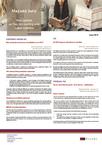
Mazars Info June 2019
CORPORATE INCOME TAX
New corporate income tax consolidation as of 2019
Belgium introduces tax consolidation as of assessment year 2020 (taxable period starting at the earliest on January 1, 2019), based on a ‘Group Contribution’ system. Group companies in tax paying position will be able to make a group contribution to group companies in tax loss position, where the latter will be able to offset this group contribution against their current year tax loss.
On December 22, 2017, the Belgian Parliament approved the Corporate Income Tax Reform Act, for which most of the measures took effect as of 2018. The second step of the Belgian CIT reform, includes measures which take effect as of 2019 including the introduction of tax consolidation: a small revolution in Belgian tax law.
The new Belgian regime is inspired by Scandinavian group contribution regimes. The application conditions are rather restrictive and complex.
90% minimum direct participation requirement
A qualifying taxpayer is a Belgian company or a foreign company established in the European Economic Area (EEA), i.e. the EU Member States and the three EEA EFTA States Iceland, Liechtenstein, and Norway that:
- is the parent company, subsidiary or sister company of the Belgian taxpayer and whereby the capital is directly owned for at least 90%. In case of sister companies this implies that a parent company should own 90% of the capital of both the Belgian taxpayer and the qualifying taxpayer and;
- is affiliated to the Belgian taxpayer for an uninterrupted period of at least 5 years.
Companies which are indirectly affiliated are explicitly excluded from the Belgian regime due to the requirement of direct participation. The rule also excludes newly incorporated companies and no rollover provisions for intra-group transfer of shares exist. The tax consolidation regime will also apply to "final" losses of foreign subsidiaries established in the EEA.
Mandatory tax contribution agreement
Tax consolidation is achieved via a group contribution agreement that should be filed as annex to the income tax return. A model agreement template will be issued by Royal Decree in due course. The agreement relates to one and the same specific assessment year only.
BEGAAP accounting implications
The draft advice from the Belgian Commission for Accounting Standards aims to clarify that the accounting implications in the BEGAAP statutory accounts will be limited. The group contribution itself is not recorded in the BEGAAP accounts and only features in the CIT return.
The new regime is optional and flexible, as taxpayers are free to annually decide prior to the filing of the annual CITR whether or not to make group contributions and to determine the appropriate amount.
VAT
No VAT charge on donations to charities
The Belgian government recently decided to expand the scope regarding the VAT-free donation of certain goods to charitable institutions.
In general, VAT taxable entities donating (for free) goods without receiving any remuneration (in cash or in kind) were faced with a negative VAT impact as the donation was considered as a taxable supply from a VAT point of view. This resulted in a reimbursement of the VAT which was initially deducted on those goods.
An exception to this rule was foreseen for the donation of food and drinks to charitable institutions which used the goods for their charitable cause.
Recently, the Belgian government decided that the scope of the VAT free donation will be expanded to other "necessary" non-food products. It has to relate to products which are necessary for a basic quality of life of the people (such as clothing).
After implementation of this expansion, companies will be able to donate these products for free to charitable institutions, rather than having these destroyed in order to avoid a negative VAT impact. With this new rule, the Belgian government hopes to fight the wastage in light of the environment and the poverty reduction.
PERSONAL TAX
Tax on securities accounts - first returns - notifications
Return - payment
The tax on securities accounts entered into force on March 10, 2018. This new tax is a tax of 0,15% and is due on certain financial instruments held through a securities account.
The tax on securities accounts only affects physical persons whose average value of the targeted financial instruments is 500.000,00 EUR or more. The average value of each securities account will have to be calculated via 3 intermediary states (on March 31, 2018, on June 30, 2018 and September 30, 2018). If there have been a change in a securities account (e.g. a change in the number of accountholders), an opening or a closure of a securities account, an additional intermediate state may have to be taken into account.
To find out if one reaches the limit of 500.000,00 EUR, one needs to:
- Create the average value per securities account on the basis of the intermediate states; and
- Then add all the average values of the securities accounts regardless of where these securities accounts are held – in Belgium or abroad.
If one holds a minimum of 500.000,00 EUR in the total number of securities accounts, the tax is due on all the securities accounts (regardless of their size).
Please note that one has to (1) submit a declaration and (2) to make a payment for the tax on securities accounts by August 31, 2019, if this tax has not been withheld by the own (Belgian) financial institution.
Notification in the personal income tax return
Please note as well that the physical person needs to report in his/her personal income tax return (income year 2018 – assessment year 2019) whether or not one is the holder of more than one securities accounts in the period between March 10, 2018 and December 31, 2018.
ACCOUNTING
Financial plan / new requirements due by the implementation of the new Belgian Companies Code
The new Belgian Companies Code defines new measures for companies to be incorporated in Belgium. Whereas the minimum share capital requirement (of 18.550 EUR) in order to incorporate a BV/SRL is abolished, this does not imply that shareholders no longer need to contribute to the company’s equity (whether in cash or in kind).
The adequacy of the funding of the company (in equity and in debt) during at least 2 years after incorporation must be demonstrated by the founders in a detailed financial plan, the content of which is more extensive than imposed by the former Belgian Companies Code.
The detailed financial plan should incorporate at least the following components:
- Accurate description of the envisioned activities of the company;
- Overview of all financing sources at incorporation and, where applicable, guarantees provided in this respect;
- Opening and forecast balance sheets after 12 and 24 months;
- Forecast of the profit and loss accounts after 12 and 24 months;
- Forecast of the cash flow (income and expenses) for a period of at least 2 years after incorporation;
- Description of the assumptions used in the financial plan;
- Where applicable, the name of the external advisor who assisted with drafting the financial plan.
A different periodicity (other after 12 and 24 months) can be used for the forecast balance sheets and profit and loss accounts provided that the forecast covers a period of at least 2 years after incorporation.
The obligation to draft a detailed financial plan for the company requires the founders to carefully consider the future funding needs of their business to be incorporated.
In case the private limited liability company would go bankrupt within 3 years after incorporation due to insufficient funding, the founders may be held liable for the company debts if the financial plan shows an obvious underfunding of the company from its incorporation.
A logical and accurate financial plan, demonstrating adequate funding of the company, will therefore be crucial in order to tackle this risk of Director’s liability.
LABOUR LAW
Update : Social elections 2020 in your company?
The social elections to be held in May 2020 may still be a long way off, but preparations need to be done already.
What are social elections?
In Belgian companies with at least 50 full time equivalents (further "FTE’s"), employee representatives are elected for two consultative bodies. The employees who fullfill the conditions to be elected, can apply for the committee for prevention and protection at work. In the companies with at least 100 FTE’s, the employees can also apply for the Works Council.
Employees can apply through 1 out of 3 representative trade unions in Belgium (ABVV, ACV of ACLVB).
When?
The social elections take place every 4 years in order to choose the employee representatives. The term of these elections is 14 calendar days and this term is set by law:
the next social elections have to take place between May 11 and May 24, 2020.
What are the most important changes for 2020?
1. Up to now, the average employment within a company or organization in order to determine the amount of FTE’s, has been calculated based on the calendar year prior to the social elections. For the social elections of 2020 this would be the calendar year 2019. The strictly regulated electoral procedure, however, would already start in December 2019. At that time it would not be clear to a lot of employers whether or not they have reached the limit of 50 or 100 FTE’s and whether they should organize social elections.
By modifying the law, this calculation was brought forward by a quarter, to October 1, 2018 until September 30, 2019. This period ends 2 months before the start of the electoral procedure.
2. Furthermore, the presence of temporary workers in the company will have to be taken into account in order to calculate the amount of FTE’s. However, only the temporary employees who have been employed within the company for at least 3 months (or a minimum of 65 working days in the event of interrupted employment) within the reference period, have to be taken into account.
Temporary employees are included in the calculation of average employment for one quarter. In the past this always concerned the last quarter of the reference period. In the adjusted reference period, the last quarter coincides with the summer months, which can cause a distorted image. According to the law, therefore, only temporary employees who were employed during the second quarter (April 1st until June 30th 2019) would be taken into account.
The abovementioned changes require extra attention and preparation within the company.
KEEP IN MIND!
- VAT return May 2019: before June 20, 2019
- Second monthly prepayment for social security contributions (Q2 2019): June 5, 2019
- Filling of fee forms (forms 281.50) - Third party commissions, fees, etc: June 30, 2019
- Third monthly prepayment for social security contributions (Q2 2019): July 5, 2019Personal income tax return – Belgian residents:
- Paper: June 28, 2019
- Via Tax-on-web: July 11, 2019
- Via proxyholder: October 24, 2019


